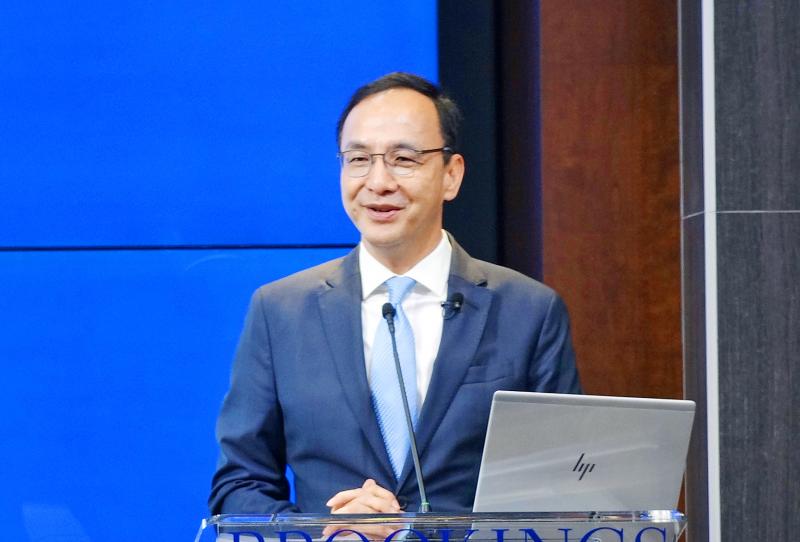Chinese Nationalist Party (KMT) Chairman Eric Chu (朱立倫) in a speech at the Washington-based Brookings Institution on Monday emphasized Taiwan’s need for enhanced defense capabilities, while adding that the party has always been pro-US.
“If you want peace, you have to prepare for war. Self-defense is No. 1 for peace and stability,” Chu said.
He offered three defense priorities for a future KMT administration: boosting asymmetric combat capabilities, arms purchases for emergency responses and raising the reserve mobilization mechanism to the Cabinet level.

Photo: CNA
It is wrong to label the KMT as being pro-China, as it has always been pro-US, he said, adding that the KMT is dedicated to defending Taiwan and to talking to China.
Taiwan could help the West better understand China and be a model for its neighbor, Chu said.
“Taiwan can have democracy; why not China some day?” he said. “We have to wait for this to happen, but we need Taiwan as a model.”
Asked by reporters about the so-called “1992 consensus,” Chu said it is a “non-consensus consensus.”
He also drew from KMT Vice Chairman Andrew Hsia’s (夏立言) comment that if all things must be clarified, non-political cross-strait interaction would suffer.
Chu’s comments were a practical response to Washington’s concerns about Taiwan’s self-defense capabilities, National Policy Foundation associate research fellow Chieh Chung (揭仲) said.
Chu’s speech was direct, which is an excellent beginning for restarting dialogue between the KMT and Washington on national defense affairs, the stated purpose of his visit, Chieh said yesterday.
Some of Chu’s views are a departure from those held by the Democratic Progressive Party, which, if pursued, could help set the tone for potential meetings between the KMT and Washington on defense issues, Chieh said.
Chu told the think tank that the KMT’s stance on 2027 and the increased risk of a military confrontation is to “prepare for combat and strive to avoid war,” Chieh said, adding that Chu dismissed certain KMT stereotypes, while clarifying that it would prioritize asymmetrical warfare capabilities upon a return to power.
Mentioning 2030, Chu showed that the KMT is aware of the potential threat of 2027, while being aware that a Chinese landing could evolve into a new threat beyond 2027, Chieh said.
Chu’s view is more prescient than some Washington analysts who overemphasize the need for certain weapons systems, Chieh said, adding that Chu’s view is becoming the sovereign national defense policy of the Republic of China.
Additional reporting by Shih Hsiao-kuang

A preclearance service to facilitate entry for people traveling to select airports in Japan would be available from Thursday next week to Feb. 25 at Taiwan Taoyuan International Airport, Taoyuan International Airport Corp (TIAC) said on Tuesday. The service was first made available to Taiwanese travelers throughout the winter vacation of 2024 and during the Lunar New Year holiday. In addition to flights to the Japanese cities of Hakodate, Asahikawa, Akita, Sendai, Niigata, Okayama, Takamatsu, Kumamoto and Kagoshima, the service would be available to travelers to Kobe and Oita. The service can be accessed by passengers of 15 flight routes operated by

Chinese spouse and influencer Guan Guan’s (關關) residency permit has been revoked for repeatedly posting pro-China videos that threaten national security, the National Immigration Agency confirmed today. Guan Guan has said many controversial statements in her videos posted to Douyin (抖音), including “the red flag will soon be painted all over Taiwan” and “Taiwan is an inseparable part of China,” and expressing hope for expedited reunification. The agency last year received multiple reports alleging that Guan Guan had advocated for armed reunification. After verifying the reports, the agency last month issued a notice requiring her to appear and explain her actions. Guan

GIVE AND TAKE: Blood demand continues to rise each year, while fewer young donors are available due to the nation’s falling birthrate, a doctor said Blood donors can redeem points earned from donations to obtain limited edition Formosan black bear travel mugs, the Kaohsiung Blood Center said yesterday, as it announced a goal of stocking 20,000 units of blood prior to the Lunar New Year. The last month of the lunar year is National Blood Donation Month, when local centers seek to stockpile blood for use during the Lunar New Year holiday. The blood demand in southern Taiwan — including Tainan and Kaohsiung, as well as Chiayi, Pingtung, Penghu and Taitung counties — is about 2,000 units per day, the center said. The donation campaign aims to boost

The Central Weather Administration (CWA) said a magnitude 4.9 earthquake that struck off the coast of eastern Taiwan yesterday was an independent event and part of a stress-adjustment process. The earthquake occurred at 4:47pm, with its epicenter at sea about 45.4km south of Yilan County Hall at a depth of 5.9km, the CWA said. The quake's intensity, which gauges the actual effects of a temblor, was highest in several townships in Yilan and neighboring Hualien County, where it measured 4 on Taiwan's seven-tier intensity scale, the CWA said. Lin Po-yu (林柏佑), a division chief at the CWA's Seismological Center, told a news conference